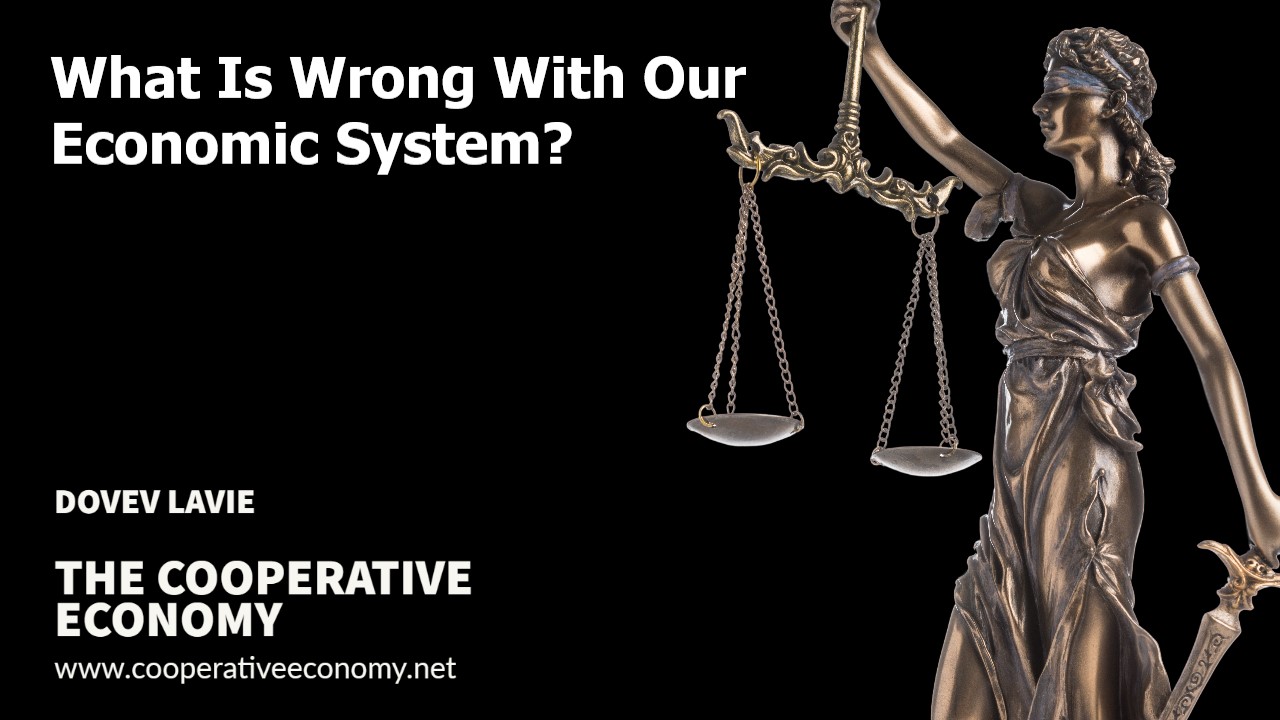
The cooperative economy is a prosocial platform system that first and foremost serves societal values, while acknowledging natural resource constraints. The cooperative economy diverts attention away from a materialistic orientation and follows a more balanced perspective that does not mix the means (accumulation of wealth) with the ends (striving for happiness). This proposed system adopts design principles that limit consumption and profit making while facilitating economic equality. The system serves the interests of consumers, vendors, and employees while preventing the accumulation of power by the platform owner who operates it. Unlike the greed that drives the current economic system, the engine of the cooperative economy is prosocial behavior. The system scrutinizes greedy individuals and penalizes opportunistic behavior such as false disclosure of information and arbitrage attempts, while motivating and rewarding prosocial behavior. Once opportunistic behavior becomes a deviant practice, self-reinforcing prosocial behavior can overtake it, leading to a more just distribution of value in the system.
The main novelty of this system is the reversal of the subsidization process. Instead of having most consumers, including the poor, subsidize the rich capital owners, the cooperative economy leverages price discrimination whereby high-income consumers subsidize low-income consumers. Prosocial behavior is the principle that underlies this subsidization process, with consumers enjoying the happiness that comes with donation and influence, while leveraging the cushion that protects them from misfortune. Unlike progressive taxation in which the state steps in as a political intermediary that imposes a burden while depriving taxpayers of their discretion and sense of contributing to society, price subsidization creates a perception of unmediated donation to community members, and thus carries the benefits of prosocial behavior. The cooperative economy also provides employees with the freedom to pursue a profession of choice or start a business without worrying too much about failure or financial distress. Hence, the system encourages entrepreneurship rather than discourages it. Free riding is also discouraged by requiring low-income consumers who receive donated products and services to repay in kind.
I discuss this and other design principles in my book, The Cooperative Economy, available from Routledge or Amazon. For more information, visit www.cooperativeeconomy.net

Once we realize that the failure of our economic system is not due to human nature per se, and that there is merely a design flaw in that system, we can strive for a solution. Indeed, we cannot amend the economic system that is driven by opportunistic behavior, but we can design a new system that is not. The mirror image of opportunistic behavior is prosocial behavior, whereby individuals seek to enhance the utility of others, sometimes at a personal cost, rather than maximize their own utility at the expense of others. Although this seems theoretical, perhaps even fictional, there is evidence documenting such behavior. Experiments suggest that about half of humanity is conditionally prosocial— that is, they will be kind to others if others are kind to them. Acts of kindness are, however, penalized in the current economic system, often met with exploitation and lack of reciprocity. By providing incentives and rewarding those who exploit others, this economic system intervenes and breaks the natural cycle of positive reciprocity. This is how opportunistic behavior drives out prosocial behavior. But the introduction of new design principles can reinforce prosocial behavior while shielding us from opportunistic behavior. Such an underlying force can undo the harm caused by the current economic system, and promote economic equality, redistribute wealth and power, cease exploitation of private data, and restrict overconsumption and abuse of natural resources, while giving more weight to local communities. Unfortunately, these objectives cannot be achieved within the realm of the current economic system. My suggestion is to incorporate the new design principles in a new economic system, which I refer to as the cooperative economy. The Cooperative Economy proposes a solution to societal grand challenges, namely economic inequality, dominance of platform ecosystems, overconsumption of resources, loss of privacy and free choice, and some drawbacks of globalization.
I discuss the proposed design principles in my book “The Cooperative Economy.” For more information, visit the book’s website.


The Cooperative Economy proposes a solution to economic inequality, dominance of platform ecosystems, overconsumption of resources, loss of privacy and free choice, and some drawbacks of globalization.
These grand challenges have taken a toll on society, and their unfortunate consequences for humanity seem inevitable. Yet all these problems have one root cause, which is mistakenly ascribed to human nature. Observers often point to greed as the underlying motive that drives opportunistic behavior at all costs. Nevertheless, we should not blame firms for seeking profits or consumers for maximizing utility. We must blame the economic system that has prioritized these aims over societal values, and that rewards the opportunistic entrepreneurs while penalizing those who strive for cooperation.
Economic theory has made some incorrect assumptions. Not all humans were born as opportunistic creatures. Some are more opportunistic than others, and the majority tend to be cooperative. So why do we mostly observe greed and opportunistic behavior in our economic system? This is due to the design of this system that reinforces opportunistic behavior beyond the tipping point. When everyone around us behaves opportunistically, we cannot afford not to. A vicious cycle transpires, whereby profit seeking becomes the default, while societal values are forgotten. Efforts to fix the economy via regulation, legislation, innovation, and aid are doomed because they treat the symptoms, not the disease. After decades of attempts to infuse compassion into a ruthless economic system, we must admit that we have failed. In my book, I explain why I conclude that the modern economic system is unfixable and offer a new approach to cope with the challenges. For more information visit the book’s website.

